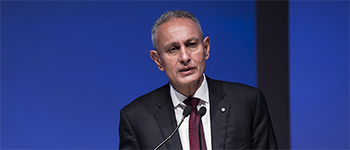World Water day: The Mediterranean can’t wait, it must act, lead and it must do so together
By the UfM Secretary General, Nasser Kamel.
Published by Asharq Al-Awsat
The burden on precious natural resources, water being first among them, is becoming ever more apparent with the passing of each record-breaking summer as climate change and the overexploitation of ecosystems combine to devastating effect. Yet, if the challenge we face is clear and the need for urgency paramount, why have solutions so far often proven elusive?
World Water Day 2020 is about water and climate change, and how the two are inextricably linked. This year’s slogan leaves no room for ambiguity: “We cannot afford to wait”. This sense of urgency reflects the Union for the Mediterranean’s vision for the water sector in our region. Whilst providing focus on traditional water management tools, such as the development of additional water supplies and the effective management of water demand, the Union for the Mediterranean also works to underline the importance of increased regional cooperation to address this common and inescapable challenge. The Union for the Mediterranean’s own Water Agenda recognises this as it aims to ensure that each and every Euro-Mediterranean country receives the necessary technical, administrative, and financial support recommendations to help achieve water security for its population and their economic activities.
Beyond global trends in climate change, this situation is further compounded in the Mediterranean as the region is expected to see more severe impacts than those forecast elsewhere, including the scarcity of natural water resources. If the world continues on its current path, projections suggest that the Mediterranean region alone may face a decrease of up to 15% in fresh water availability. But, what will this look like in human terms? Estimates suggest over 250 million people will be considered ‘water poor’ within 20 years, that’s around the combined populations of Egypt, France and Turkey with limited access to a basic necessity of life.
But our efforts must be made in unison. Just as this year’s World Water Day sparks discussions that must lead to concrete and measurable actions, not more pledges or promises, the Union for the Mediterranean will strive to take full advantage of this year in which it commemorates the 25th Anniversary of the launch of the Barcelona Process, the political accord that gave birth to it as a platform positioned uniquely to foster the kind of Euro-Mediterranean cooperation our region so desperately needs. By bringing together the necessary range of experts, we can learn from each other’s experiences, we can develop common strategies and we will share the rewards of progress in the field of water security.
In order to better understand these changes and tackle the corresponding challenges, the Union for the Mediterranean, within the framework of the ministerial mandate entrusted to it, has supported the work of a network of scientists from the region (MedECC) who will deliver this yeared the first every scientific report on the impact of climate change in the region and its summary for policymakers. This endeavour relies on the power of multi-disciplinary competences to show decision-makers the mutual benefits and trade-offs that are to be gained if future energy, food and ecosystem security plans are integrated with water policies.
Average annual temperatures are now 1.4 degrees higher than that of the pre-industrial era and as the acidity of seawater increases, it is set to affect the survival of certain species. Over the next few decades, summer rainfall is estimated to decrease by 10% to 30% in some regions. Needless to say, this which will further exacerbate existing water shortages and decrease agricultural productivity. Add to this the environmental challenges posed by factors such as changing land use, growing urbanisation and tourism, agricultural intensification, degradation of land and the pollution of air, land, rivers and oceans, then very quickly, the situation can appear bleak in the absence of action.
Widespread and reinvigorated sustainable development is needed in the region more than ever. But the task at hand cannot be understood never mind achieved if we plan the management of water, energy, food and ecosystems as separate resources. As these areas are so strongly interlinked, water allocation regimes will have to improve, even be restructured, in order to cope with current and future shifts in water availability and demand. If we can overcome the urgent challenges it faces, especially those related to climate change, the Mediterranean will surely assume a decisive influence in shaping the world of tomorrow.

Nasser Kamel
Nasser Kamel is the Secretary General of the Union for the Mediterranean.
